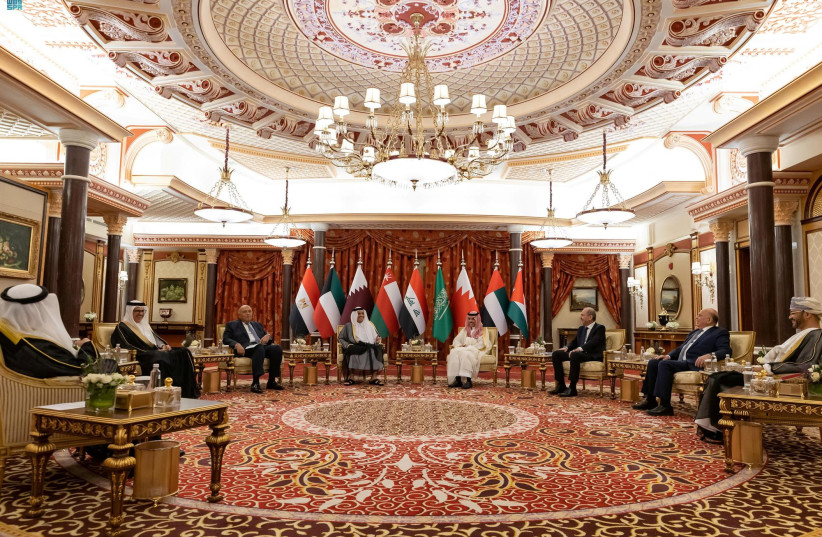Bahrain and Qatar are now reconciling after years of tensions, according to the Bahrain News Agency and Qatar Foreign Ministry, making Bahrain the latest in a string of countries to reconcile with Qatar. It also terminates years of a standoff dating back to 2017, when Saudi Arabia led the UAE, Bahrain and other countries to break relations with Qatar.
The move comes in the wake of normalization of ties between Qatar, and close allies Saudi Arabia and the UAE. Saudi Arabia has long worked closely with Bahrain, even sending troops to help stabilize it in 2011 during Arab Spring protests. When Bahrain and the UAE signed the Abraham Accords in 2020, it was assumed both had consulted Riyadh and received support for it behind the scenes. Now, reconciliation with Doha is part of the new diplomatic era in the region.
Last month, Saudi Minister of Economy and Planning Faisal bin Fadel Al-Ibrahim met with the Emir of Qatar Sheikh Tamim bin Hamad Al Thani in Doha, and, in November, Saudi Arabia’s Crown Prince Mohammed bin Salman attended the World Cup in Qatar, both important symbols of the reconciliation. Saudi Arabia is also leading rapprochement with Syria and Iran, and looking to end the conflict in Yemen through talks in Oman.
The dispute between Saudi Arabia, Bahrain, the UAE, Egypt and Qatar goes back a decade. The four countries have accused Doha of hosting extremists, including Muslim Brotherhood figures. Crises in 2014 and 2017 eventually led an attempt to blockade Qatar and cut ties.
Two years ago, the boycott ended, a shift in policy that coincided with US president Donald Trump leaving office in 2021. Saudi Arabia led three other countries to break relations with Qatar early on during the Trump presidency. Trump arrived in Saudi Arabia in May, 2017, where he met with the Saudi King and some 50 Muslim and Arab leaders from various countries. In June, Riyadh led Bahrain, the UAE and Egypt to cut ties with Doha, and in January, 2021, the countries reversed course.
Part of the bigger picture
The reconciliation between Bahrain and Qatar is also part of the larger policy of the Gulf Cooperation Council (GCC), comprising six countries. The deal between Bahrain and the GCC was announced in the Saudi capital of Riyadh at the headquarters of the GCC, according to a report at DW News.
Al Jazeera noted that “delegates from the two countries met on Wednesday at the headquarters of the GCC General Secretariat in... Riyadh, the countries’ foreign ministries said in separate statements. Both sides met to ‘enhance the Gulf unity and integration according to the GCC Charter,’ Qatar’s Foreign Ministry said in its statement.” According to this report, Qatar’s Ministry of Foreign Affairs Secretary-General Ahmed bin Hassan al-Hammadi met with Bahrain’s Ministry of Foreign Affairs Undersecretary for Political Affairs Sheikh Abdulla bin Ahmed Al Khalifa.
The deal comes as the UAE and Qatar are also working on resuming full diplomatic ties.
“Work is underway between the Qatari and Emirati teams to reopen the respective embassies as soon as possible, exact date to be announced upon the finalization of the process,” Qatar’s International Media Office told CNBC in a statement. The UAE said that its “foreign policy is primarily focused on building bridges, economic cooperation and regional deescalation.
Since the signing of the Al-Ula Declaration in January, 2021, the UAE restored relations with Qatar, with several visits occurring between the two countries, including discussions on the further development of relations and of jointly achieving greater mutual prosperity and progress for the two countries and wider region.
The Bahrain-Qatar deal also comes as Saudi Arabia’s foreign minister traveled to Damascus for important talks with the Syrian regime, as well as after US Senator Lindsey Graham visited Saudi Arabia and Israel and discussed the chances of Israel-Saudi normalization.
It also comes as Saudi Arabia’s crown prince received Palestinian Authority President Mahmoud Abbas and as members of Hamas traveled on a religious pilgrimage to Mecca. This is evidence of Riyadh positioning itself as a center of diplomatic activity. The Bahrain-Qatar deal, backed by Saudi Arabia is part of the recent surge in diplomatic activity.

